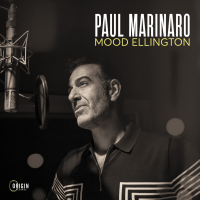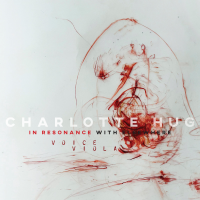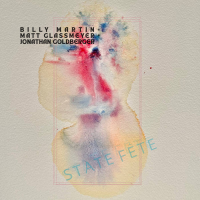Home » Jazz Articles » Album Review » Benjamin Boone: Caught in the Rhythm
Benjamin Boone: Caught in the Rhythm
The interaction between poets and jazz musicians has been brought to the public largely in the jam format, where musicians play a tune, and poets join in per chorus, just as musicians do, fitting their versing into the cadence provided by the music. The methodology of Boone's work is quite different, with Boone composing music for each poem, with specific attention to not only its cadence and structure, but also to its content. His soaring, energetic playing on soprano saxophone acts like a sonic respirator between verses, where the poet and the poem can regain its balance, and regain its breath. It is, as though it is a second non-verbal voice that appears as the alter-ego of the poet.
Boone embarked on this journey through two albums with Detroit-born poet Philip Levine, a long- time colleague of Boone's at California State University, Fresno. The first volume, The Poetry of Jazz (Origin, 2018) featured Levine narrating his own works, centred on life personified in his Detroit upbringing. A year later a second volume was released in the same format, with both featuring prominent jazz artists including Branford Marsalis, Tom Harrell and Chris Potter. Boone's writing and playing added dynamics which perfectly described the visual template created by Levine in his poetic narrative of America's industrial heartland.
Boone's third effort, The Poets are Gathering (Origin, 2020) packed a powerful social narrative post-pandemic, with Boone this time gathering a collection of modern poets which included Juan Felipe Herrera, Patricia Smith, T.R. Hummer and Kimiko Hahn. Boone led a cadre of jazz musicians centred around a rhythm section of drummer Ari Hoenig, pianist Kenny Werner and bassist Corcoran Holt among others.
This time around, Boone followed a similar format with a convergence of poetic voices performing alongside an astonishing collection of modern jazz talent, with trumpeter Ambrose Akinmusire, saxophonist Greg Osby, guitarist Ben Monder and drummer John Bishop among them. Hoenig, Holt and Werner return as the main rhythm section.
The poets on the recording represent a wide cross-section of the US poetry scene. With four pieces included in the collection, black queer writer & editor Faylita Hicks offers compelling, dynamic storytelling which ranges from her modern poetic social narrative, "Hoodwitches," to the vocal- rap piece, "We Bring the Soul to It." Her artistry is living proof of where hip hop and jazz can merge to create a natural, important and inevitable journey within the jazz idiom that artistically achieves excellence.
The title track best represents Boone's premise in bringing together these two powerful artistic forms. The poetry of Haitian-American poet Patrick Sylvain, provides a strong narrative for Boone's heavy percussion- laden music which features trumpeter Akinmusire and percussionists Hoenig and Rodrigo Dalla. The poem speaks to the human body surrendering to its natural, rhythmic impulses. "Art Pepper," is an homage to the alto saxophone great, describing his gigantic presence as a musician, and the deep blue opposition of his human qualities and addictions. Poet Edward Hirsch reads while the band swings hard, the alto saxophone recitations blending fierce, distinct, glistening tones from the horn of Greg Osby. The beat dances forward through the intelligent comping of Werner, and the intricate skip beats of Hoenig.
"Poem 836-The Diviner" offered by American poet Hahn stands out from the rest of the tracks musically, beginning with a dark, atmospheric soundscape from guitarist Monder. Hahn's poem speaks to the urban realities surrounding her teaching of undergraduate students in Queens, NY. Her poetry explores love, sexuality, death and mundane realities and what gender inscribes into modern, urban life—in this case, made that much more powerful by the musical musings of Monder, bassist Peter Brendler and drummer Bishop.
T.R, Hummer returns to Boone's project with "Anger Management," "Mississippi" and the dark intensity of "You'll Be Sorry." The music for the latter is a modal soundscape where Boone's brooding, mind-bending playing acts as an amplifier of thought and literary expressionism. 2017 Pulitzer Prize winning poet, Tyehimba Jess joins with "Mercy," accompanied by the eerie string work of violinist Stefan Poetzsch and the sparse harmony of Werner's piano. The poem and the vibe of Boone's score speak to war as being human and pitiful, spreading misery to all and teaching its children the same. It is a powerful piece of literature, in full dark brilliance, illuminated by sound.
Boone's quartet of poetry albums acts like a four movement suite of sorts. While poetry earns a snapshot here and there in the world of jazz recordings, Boone has created a movie- like sequence of excellent jazz music and musicians alongside literary, poetic genius not found in modern "spoken word" forms. It presents poetry for what it is—high art, side by side with the height of artistry in Black American music.
Track Listing
Mississippi 1955 Confessional (T.R. Hummer); HoodWitches [Redux] (Faylita Hicks); Caught in the Rhythm (Patrick Sylvain, feat. Ambrose Akinmusire); Art Pepper (Edward Hirsch, feat. Greg Osby); We Bring the Soul to It (Faylita Hicks); Poem 836 / The Diviner (Kimiko Hahn); The Case Against Poetry (Edward Hirsch); Anger Management (T.R. Hummer); ASMR Sleepcast: The Night After Being Released from the Rural County Jail (Faylita Hicks); Olivia Suggests All the Women in Class Imagine Male Sexuality (Kimiko Hahn); Mercy (Tyehimba Jess); Dawg, What the Fuck Ima Do With a $20? (Faylita Hicks); You'll Be Sorry (T.R. Hummer)
Personnel
Benjamin Boone
saxophoneKimiko Hahn
poet / spoken wordFaylita Hicks
poet / spoken wordEdward Hirsch
poet / spoken wordT. R. Hummer
poet / spoken wordTyehimba Jess
poet / spoken wordPatrick Sylvain
poet / spoken wordAmbrose Akinmusire
trumpetGreg Osby
saxophone, altoKenny Werner
pianoCorcoran Holt
bassAri Hoenig
drumsBen Monder
guitarEyal Maoz
guitarHashem Assadullahi
saxophonePeter Brendler
bassJohn Bishop
drumsKevin Person, Jr.
pianoPhilip Sarkisian
bass, electricAdditional Instrumentation
Mckenna Reeve: drums; Jonovan Cooper: tenor saxophone; Max Hembd: trumpet; Francisco Torres: trombone; Stefan Poetzsch: violin; Rodrigo Dalla: congas & triangle
Album information
Title: Caught in the Rhythm | Year Released: 2023 | Record Label: Origin Records
Tags
PREVIOUS / NEXT
Support All About Jazz
 All About Jazz has been a pillar of jazz since 1995, championing it as an art form and, more importantly, supporting the musicians who make it. Our enduring commitment has made "AAJ" one of the most culturally important websites of its kind, read by hundreds of thousands of fans, musicians and industry figures every month.
All About Jazz has been a pillar of jazz since 1995, championing it as an art form and, more importantly, supporting the musicians who make it. Our enduring commitment has made "AAJ" one of the most culturally important websites of its kind, read by hundreds of thousands of fans, musicians and industry figures every month.


































